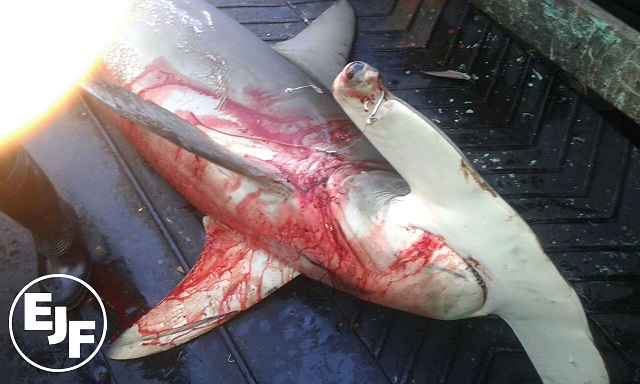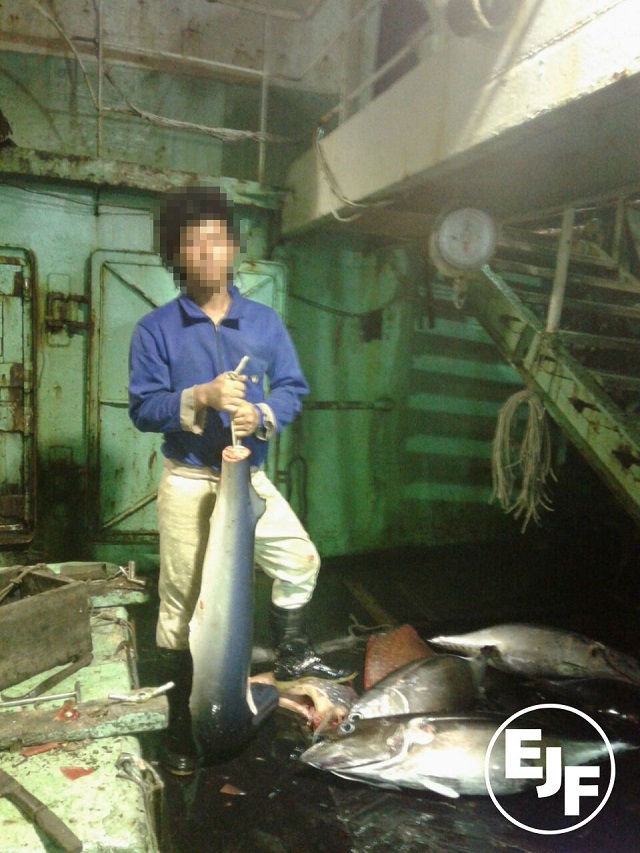Crew Beaten and Sharks Finned on Taiwanese Fishing Vessel
The Environmental Justice Foundation (EJF) has claimed to have documented gross human rights violations and serious illegal fishing offenses on board the Taiwanese fishing vessel Fuh Sheng 11.
In May, the Fuh Sheng 11 became the first ever vessel to be detained under the International Labour Organization’s Work in Fishing Convention C188. South African officials cited a lack of work agreements and crew list, rotten lifebuoys, missing anchors and generally poor health and safety conditions, but the situation is much graver than first thought, the EJF investigation revealed. Crew members told EJF of beatings from the captain, 22-hour working days and serious injuries to crew working in dangerous conditions. They also reported that the vessel had illegally finned sharks, including endangered hammerheads.
At the time of its detention in Cape Town, a Taiwanese Fisheries Agency official visited the ship. The official reportedly issued questionnaires to crew in the presence of the captain – who allegedly beat crew regularly – and the crew said afterwards that they did not know who was giving them the questionnaires or what protections they would have if they reported the true conditions on the vessel. In addition, no interpreter was present despite some crew being unable to read the questionnaires.
Following this and despite the findings of South African authorities, Taiwan’s Fisheries Agency issued a statement saying that their investigation had determined that the vessel only needed a few repairs, and it was allowed to leave Cape Town without facing any sanctions relating to human rights abuses or measures to protect the crew. EJF traced it to Mauritius in August, where, despite the Taiwan government having access to sophisticated vessel monitoring systems tracking the vessel and a trained fisheries official based in the Indian Ocean port, there was no further effort made to inspect the vessel or protect its crew.
At this point, amidst growing attention from NGOs and the media, most of the crew were sent to their home countries, where EJF made contact with them with the help of local partners. Along with the beatings, the crew said medical supplies were lacking and safety equipment was insufficient or broken. The men reported several serious injuries on the vessel and told EJF interviewers that they were “lucky” if they got six hours rest a day.
“We sometimes slept only three hours. It was like slavery. There were many cockroaches in the food […] and insects in the bedroom. I had a small boil on my leg which became so swollen that my trousers didn’t fit, and my tendon became taut. I shouldn’t have been working, but I was forced to,” said one man.
Another crew member described seeing his crewmate hit by the captain. “We felt angry, but could do nothing while at sea. […] We don’t dare because we are not…because Indonesian crew are only laborers, not people with standing.”
Salaries were below the Taiwanese minimum wage, and even then, deductions were made; one crew member reported that because of deductions he only received a monthly salary of only $50 for the first five months.
Human rights abuse was not the only factor – the crew were able to provide photographic evidence of hammerhead sharks – several species of which are endangered – and other vulnerable shark species being caught as well as photographic evidence that sharks were finned, which is against Taiwanese law.
Taiwan is currently subject to a formal warning from the European Union – known as a 'yellow card' – for not combating illegal fishing.

that matters most
Get the latest maritime news delivered to your inbox daily.


